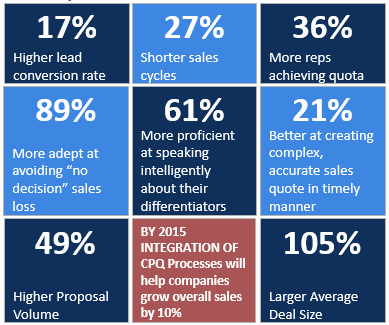Driving Growth through CPQ Solution
For B2B companies, the demand for customization and a compelling user experience poses a new set of challenges. Sales reps face more pressure to produce winning quotes faster and more profitably. At the same time, the different applications that need to communicate with each other to optimize sales enablement have, quite frankly, made integration issues a major headache for IT departments. So, uniting back-office with front-office processes is more crucial than ever.
Companies initially invest in CRM to support their sales pipeline;, hHowever, CRM falls short of solving their most pressing business problems. The most vital business operations, including the entire sales cycle, flow outside the core competencies of a CRM system. As a result, the most critical business processes are left to be executed manually. When businesses sell their products and services using manual processes, they create inefficiencies that starve them from additional revenue.
Configure, – Pprice -, Qquote (CPQ) is a software that helps companies correctly create quotes for highly customizable products, such that the offerings respect all product configuration rules, pricing rules, and product catalogue information.
In its inception, CPQ, or Product Configuration as it was known then, was geared towards the manufacturing industry, but it has since grown to be used broadly in the technology, medical, telecom, and even insurance industries. This has happened not only because product portfolios are constantly changing, but also because buyers have greater expectations. Regardless of industry, customers expect instant quotes even for the most complex products, and CPQ enables that through easy- to- use configuration tools.
Also, while CPQ was traditionally viewed as a selling tool, other departments are quickly realizing its benefit. Legal departments appreciate the contract management features. Financial departments benefit by seeing margins on quotes and orders grow due to accuracy and shorter sales cycles. A CPQ solution touches various silos within a business throughout the selling cycle, making for a unified and seamless experience that satisfies customers’ needs and expectations.
A CPQ solution integrates with front-end systems – like CRM and e-Commerce platforms – and back-end systems – like PLM or ERP – in order to have access to the latest sales, marketing, and engineering data.
On the front end, CPQ configurators provide intuitive, elegant, and user-friendly interfaces that let sales representatives tailor offerings to the precise requirements of their customers. It can even be opened up to customers themselves, allowing a ‘self-service’ model that helps businesses raise product awareness and generate qualified leads.
Some of most-loved features include:
- Guided Selling: Guided Selling Tool to streamline complex quoting processes. Guided Selling simplifies configuring and quoting, and steers users through even the most complicated product and service offerings, while simultaneously driving cross and up-sells.
- Pricing Automation: Pricing Automation tool provides accurate real-time pricing and product information during the quoting process, while also offering multi-currency transactions, cross-sell suggestions, and more. Customization options let you handle product groupings, discount constraints, and role-based pricing easily.
- Quotes & Proposals: Quoting speeds up your quote process while ensuring your company’s brand is consistent and accurate. Organize your critical data, create brand templates, and track quotes for every deal. More information, more organization, and more consistency mean you can produce high-quality, accurate quotes in minutes.
- Business Analytics: CPQ tool allows users to easily build custom reports. Its out-of-the box integration with BI tools means you’ll have the reports you need without extra development hours.
Below are some of the benefits of CPQ system:
- Faster, accurate, error-free quoting that uses the latest product and pricing information
- Increased revenue through cross- selling and upselling
- Shorter sales cycles with automated workflow approval processes that keep price margins in check
- Seamless handoff to order management – convert your quotes directly into orders without the need for manual validation
- Faster time- to- market and improved organizational agility. Spend less time training your sales force since the software guides the quoting process
- Easier for partners and resellers to do business with your company because demands for product knowledge are much lower
- Needs-based selling intuitively maps customer requirements to the right products and features
- Better customer satisfaction due to quick turnaround times and customized products built to precision
- Reduced errors by removing the need for manual data entry in multiple systems.
As per Aberdeen Research, Companies which used CPQ achieved:

The impact of CPQ is significant and can be quantified across an organization. It can vary fFrom spending less time producing proposals, to improving up-selling and cross-selling, along with disciplined margin protection and higher close rates. Making small improvements in sales, operating and financial practices, has the opportunity of producing significant enterprise results as below:
- Product Differentiation: Mass customization, value-based selling and packaging of services represent leading approaches for growing sales in manufacturing. CPQ solutions provide the flexibility needed to offer a wider range of choices to buyers, while also ensuring compliance with corporate policies and compatibility between different products and components. Also, with greater variation they can improve alignment with customers’ preferences, as well as open up new markets based on product changes.
- Improve Your Company Revenue Growth: Decreasing the quote-to-order process has a direct correlation with an increase in total company revenue growth. Your sales reps can focus more on building relationships and spend less time processing paperwork.
- Increase Conversions: By automating your quote-to-order system, organizational efficiency is increased resulting in overall conversion improvement.
- Account Growth: Recurring business represents a major share of manufacturing revenues, whether from direct sales or from partners. Revenues from truly “net new” customers often represent less than half of the total business of many manufacturers, particularly in B2B industries. Moreover, the cost and effort to grow an existing relationship, where trust, reputation and a track record is established, is much less than winning a new customer.
Leading Trends:
Gartner estimated the CPQ market at $570M in 2015, but the real growth is happening in Ccloud-based CPQ solutions, where CPQ saw a 46% growth year-over-year. As companies replace on-premise and legacy quoting solutions with Ccloud-based solutions, the CPQ market will continue to be one of the hottest areas of business. The primary reason is simple – CPQ solutions make life easy and more efficient for buyers and sellers. Additionally, Ccloud CPQ systems scale with company growth and tend to have higher adoption rates than on-premise counterparts due to mobile-first solutions and integration with customer relationship management (CRM) systems.
With Amazon becoming the gold standard for how online shoppers want their buying experiences to be, B2B organizations believe they are at a disadvantage in how they allow buyers to purchase from them. This Amazon paradigm and expectation is now moving to the business world. 86% of buyers will pay more for a better customer experience, but only 1% of customers feel that vendors consistently meet their expectations. The CPQ and Commerce Cloud integration can help bridge the gap between customer expectation and actual experience. It gives users a way to self-select their product of choice with the guided ability to configure, quote and purchase all within minutes, and alleviates labor- intensive processes that have become outdated and increasingly expensive and frustrating.
Latest Blogs
Core banking platforms like Temenos Transact, FIS® Systematics, Fiserv DNA, Thought Machine,…
We are at a turning point for healthcare. The complexity of healthcare systems, strict regulations,…
Clinical trials evaluate the efficacy and safety of a new drug before it comes into the market.…
Introduction In the upstream oil and gas industry, drilling each well is a high-cost, high-risk…




